If you have just welcomed a new litter of puppies into your home, you are in for a lot of work! Caring for newborn puppies is not easy, but it is rewarding.
In this blog post, we will provide 10 tips that will help you care for your new litter of puppies.
Puppyhood is a critical stage in a dog’s life, and it is important to make sure that they get off to the right start. Follow these tips and you will be able to raise healthy and happy puppies!
- Key Takeaway
- How To Care For a Newborn Litter of Puppies
- 1. Set up a comfortable and safe area for the puppies
- 2. Get high-quality puppy food
- 3. Set up a feeding schedule
- 4. Closely monitor the weight gain
- 5. Keep the handling of the puppies to a minimum
- 6. Clean or change their bedding every day
- 7. Switching to a solid food
- 8. Do not show your newborn litter of puppies to your friends
- 9. The first veterinarian visit
- 10. Time to start house training
Key Takeaway
- To care for a newborn litter of puppies, monitor their nursing habits and physical appearance every 2-3 hours, provide a warm and safe environment, and consult with a veterinarian if any health issues arise.
- Newborn puppies should be initially weighed twice a day for the first week or two, then daily to ensure consistent weight gain.
- Common issues when caring for a newborn litter of puppies include poor nursing, fading puppies, diarrhea, constipation, infection, and abnormal physical appearance or behavior.
How To Care For a Newborn Litter of Puppies
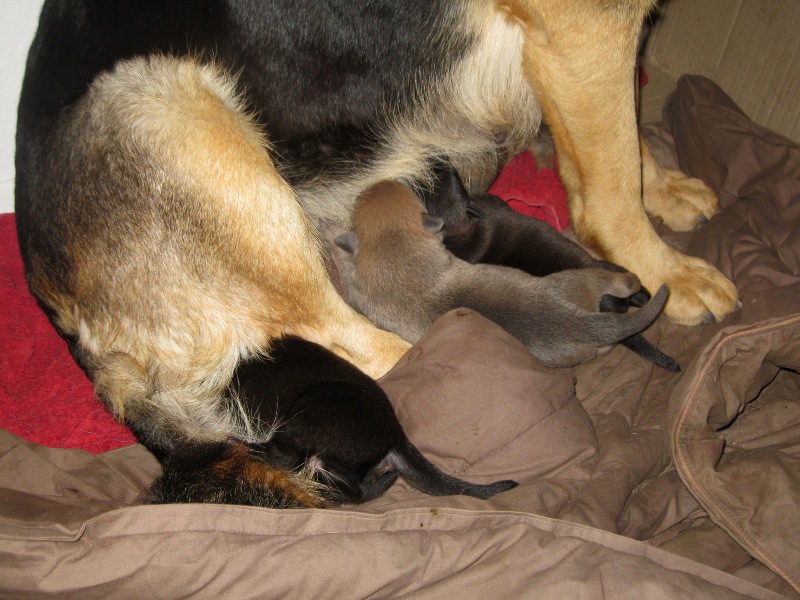
Caring for a newborn litter of puppies is a delicate thing. There are many things that you need to get right to successfully care for a newborn litter of puppies.
Here are 10 tips on how to care for a newborn litter of puppies:
1. Set up a comfortable and safe area for the puppies
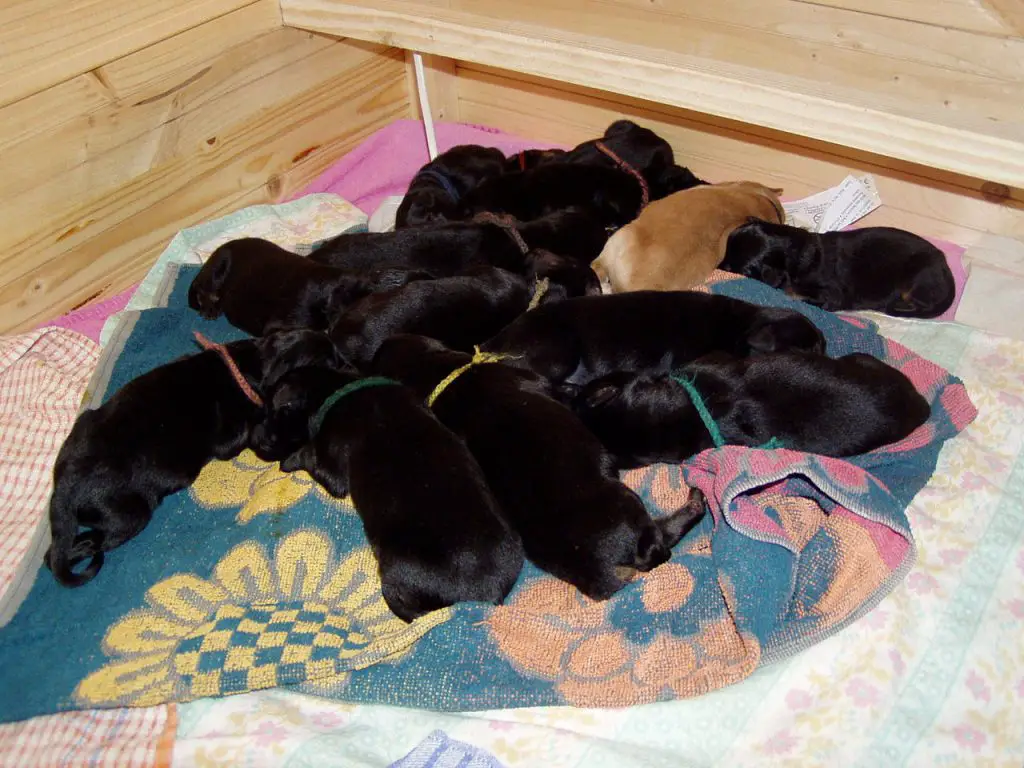
You will need to prepare a warm and comfortable area for the mother and her puppies. This could be a whelping box, pen, or make-shift bed in a quiet corner of the house.
The important thing is that the area is safe, cozy, and draft-free. You may need to line the area with towels or blankets to make sure it is extra snug for the little ones.
I suggest you put some plastic cover on the very bottom so the waste from the puppies doesn’t destroy your floor or carpet. If there is a mom present in the upbringing of the newborn litter, she will clean the mess. However, if the mom is out of the picture, you will need to clean the mess daily.
Puppies cannot regulate their body temperature so they will rely on their mother and their surroundings to stay warm. Puppies need to be kept warm, so a good rule of thumb is to keep the room temperature between 80-90 degrees Fahrenheit (26.6 C to 32 C).
If you are using a heat lamp, make sure it is not too close to the puppies or they could get burned. You can also use a hot water bottle wrapped in a towel to provide extra warmth. As the puppies enter the second week of their life, you can start to gradually decrease the temperature to about 75 degrees Fahrenheit.
2. Get high-quality puppy food
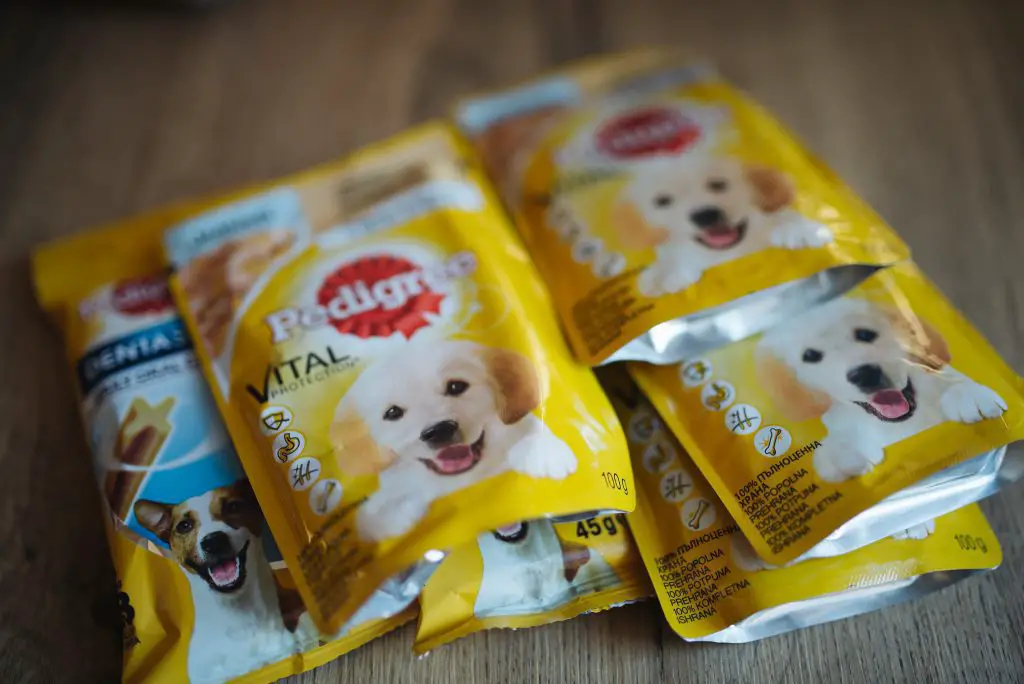
The best food for newborn puppies is their mother’s milk. However, if the mother is out of the picture, you will need to buy high-quality puppy food. Some general tips can help you choose the right food for your newborn litter of puppies:
- Look for a food that is specifically designed for newborn puppies. This type of food will be easy for them to digest and will provide all of the nutrients they need.
- Avoid foods that contain artificial additives or preservatives. These can be harmful to your puppies’ health.
- Choose a food that is high in protein and fat. Puppies need plenty of energy to grow and develop, so a higher-calorie diet is important.
- Ask your veterinarian for recommendations. They can help you choose the best food for your specific litter of puppies.
Choose quality puppy food and feed them according to the manufacturer’s instructions, and they will have all the energy they need to grow and thrive. Puppies are a lot of work, but they are also a lot of fun.
3. Set up a feeding schedule
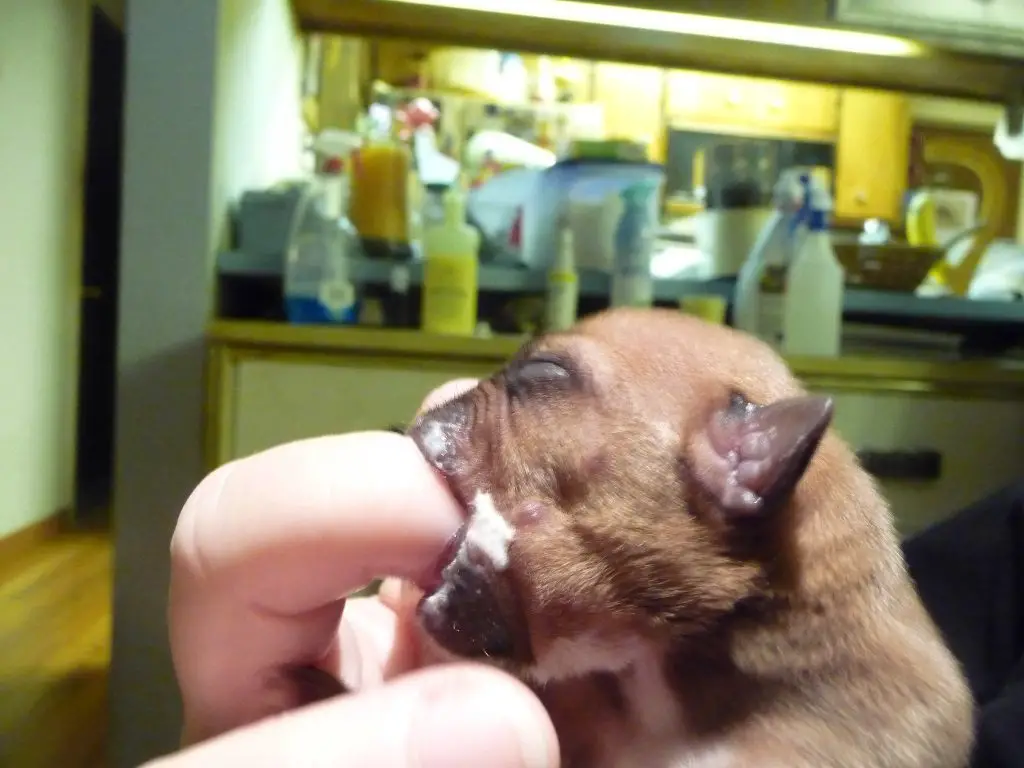
Newborn puppies need to be fed every two to three hours, so you will need to set an alarm to remind yourself. It is best to feed them with a syringe or small bottle as they cannot yet lap up food from a bowl.
Puppies should only have access to their mother’s milk for the first few days. However, if the mom is out of the picture, you will need to feed them with commercial newborn puppy food.
Syringe feeding is necessary when a puppy is not able to nurse from its mother properly. This can happen for a variety of reasons, including if the mother is unable to produce enough milk, or if the puppy is too weak to suckle effectively.
To syringe feed a puppy, you will need:
- A syringe (without the needle attached)
- Puppy formula milk replacer
- A towel or blanket (to keep the puppy warm while you’re feeding them)
Warm up the puppy formula milk replacer. This can be done by mixing it with warm water, or by placing the container of formula in a bowl of warm water. The milk replacer should be at body temperature before you attempt to feed it to the puppy.
Fill the syringe with the warmed milk replacer. Gently insert the syringe into the side of the puppy’s mouth and slowly depress the plunger, allowing them to take in as much milk as they need.
If you’re having trouble getting the syringe into the puppy’s mouth, try rubbing some honey or Karo syrup on their lips.
Once you’ve finished feeding the puppy, make sure to clean them up and keep them warm. You can do this by gently wiping them down with a damp cloth and then wrapping them in a towel or blanket says VCAHospitals.
4. Closely monitor the weight gain
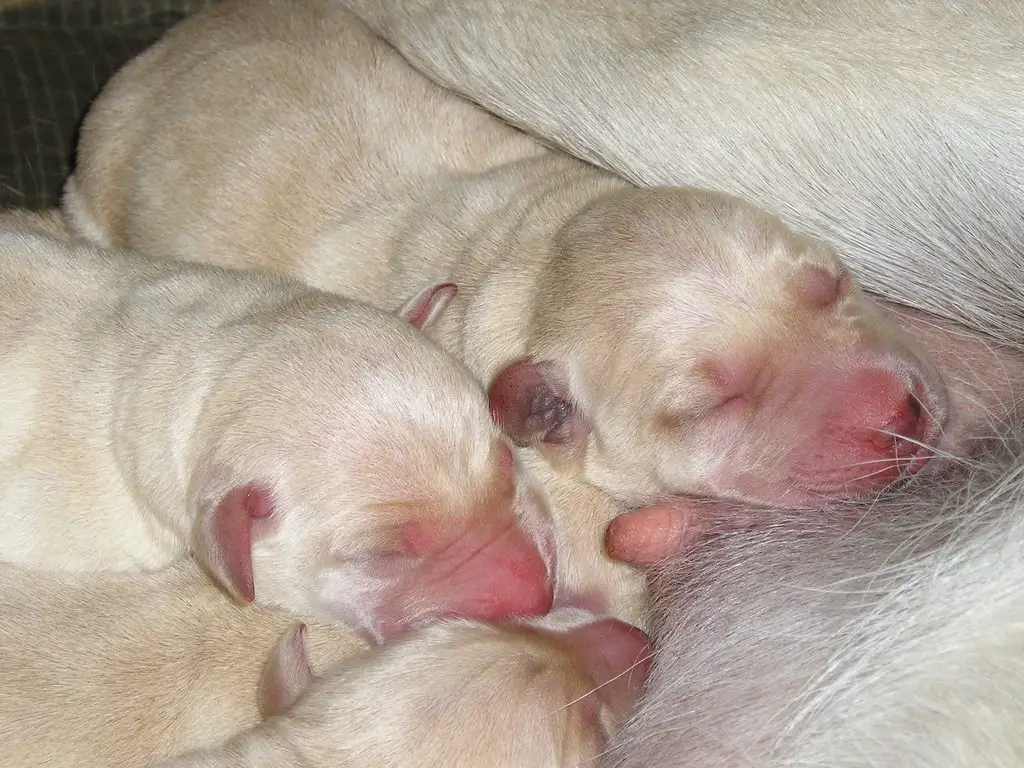
Newborn puppies gain weight rapidly during their first few weeks of life. They should double their birth weight by day 14 and triple it by day 21.
Puppies typically gain about 0.45 ounces per day during this growth spurt. If your puppy is not gaining weight or appears to be losing weight, contact your veterinarian immediately.
Puppies should eat every two to three hours during their first few weeks of life. Newborns may need to be fed as often as every hour in the early days.
As they grow and start to nurse more effectively from their mother, they will be able to go longer between feedings. If you are bottle-feeding your puppies, you will need to use a special puppy formula that is easily digestible and contains all of the nutrients they need to grow.
One way to tell if your puppies are getting enough food is by monitoring their weight gain. Puppies should gain about ½ ounce per day during their first week of life. If they seem sluggish or uninterested in eating, it may be a sign that they are not getting enough food.
Another way to tell if your puppies are getting enough to eat is by checking their stools. Newborn puppy stools should be soft and easy to pass. If the stool is hard or there is blood in it, this may be a sign of dehydration or an underlying health problem.
5. Keep the handling of the puppies to a minimum
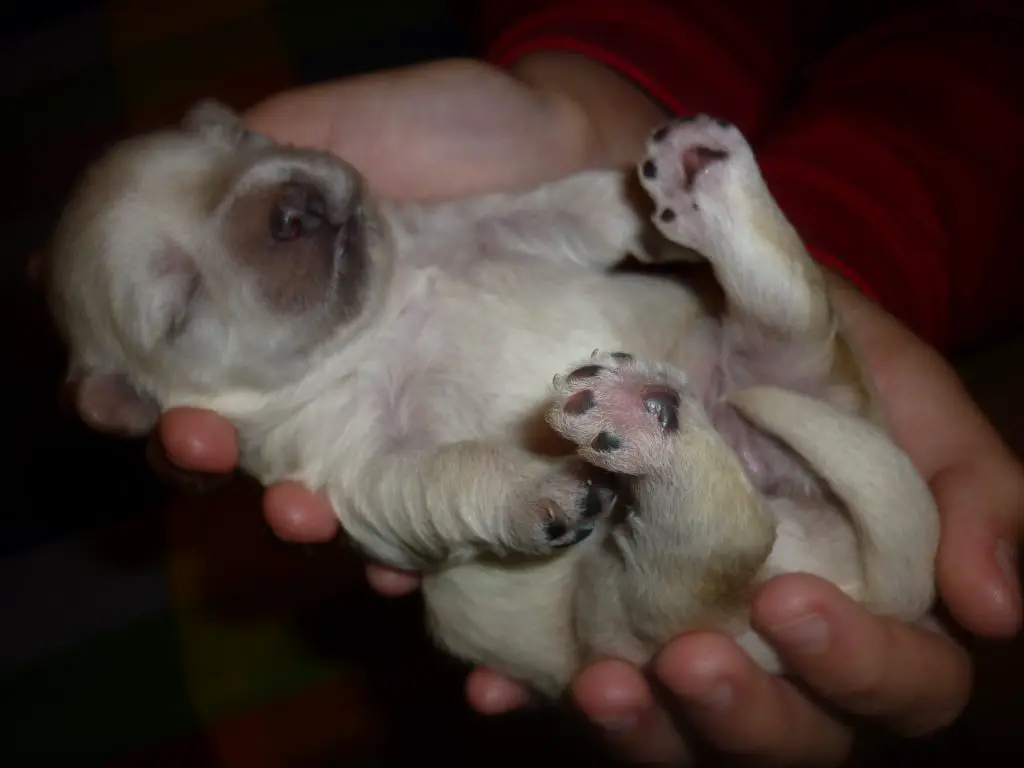
During the first two weeks of the puppy’s life, you need to try and keep the handling to a minimum. In the first two weeks of their life, the puppies are developing a relationship with their mother and their brothers and sisters.
The mother (if present) will keep a strong eye on the puppies and will monitor each move they make.
Keeping the handling of the puppies to a minimum will help them bond with their mother and siblings. They will be able to develop strong relationships and have their own space.
This means that only pick them up if you are trying to weigh them, feed them, or tuck them in. I know that young puppies are cute. But, try to contain yourself and just watch them without picking them up.
Now, when you have to handle the puppies, make sure that you are doing it the correct way.
First and foremost, gently wash your hands with soap and water before handling any puppies. It’s important to avoid transferring any bacteria or germs from you to them.
Next, support the puppy’s head and neck as you lift them out of the whelping box or nest. Puppies are unable to support their heads at this age so be very careful not to let their head flop around too much.
Once you have the pup in your arms, use a warm, soft cloth to dry off any remaining amniotic fluid on its fur. Be sure to keep a close eye on their temperature; newborn puppies can easily become cold so it’s important to keep them warm.
If the pup is crying, try gently rubbing its tummy in a clockwise direction. This usually helps to soothe them and can help them to pass gas.
Last but not least, never forget that puppies are fragile creatures. Handle them with care and always supervise young children around puppies to avoid any accidents.
6. Clean or change their bedding every day

Puppies urinate frequently, often every 20-30 minutes when they are firstborn born. They may have a bowel movement after each feeding or up to several times a day.
As they get older, they will urinate and defecate less often. By the time they are adults, most dogs will urinate and defecate once or twice a day. Some breeds of dogs may need to go more often than others.
Cleaning the bedding of newborn puppies every day is important because when puppies are first born, they are unable to control their bodily functions.
This means that they will urinate and defecate where they sleep. If their bedding is not cleaned regularly, the puppies can become sick from the bacteria in their waste.
Additionally, cleaning their bedding helps to keep the smell of the puppy area down. No one wants to be around a smelly puppy! Lastly, it just makes the whole area look nicer and more inviting for both you and your visitors.
Newborn puppies are very delicate and need to be handled with care. The bedding should be changed every day to ensure that the puppies are kept clean and comfortable.
7. Switching to a solid food
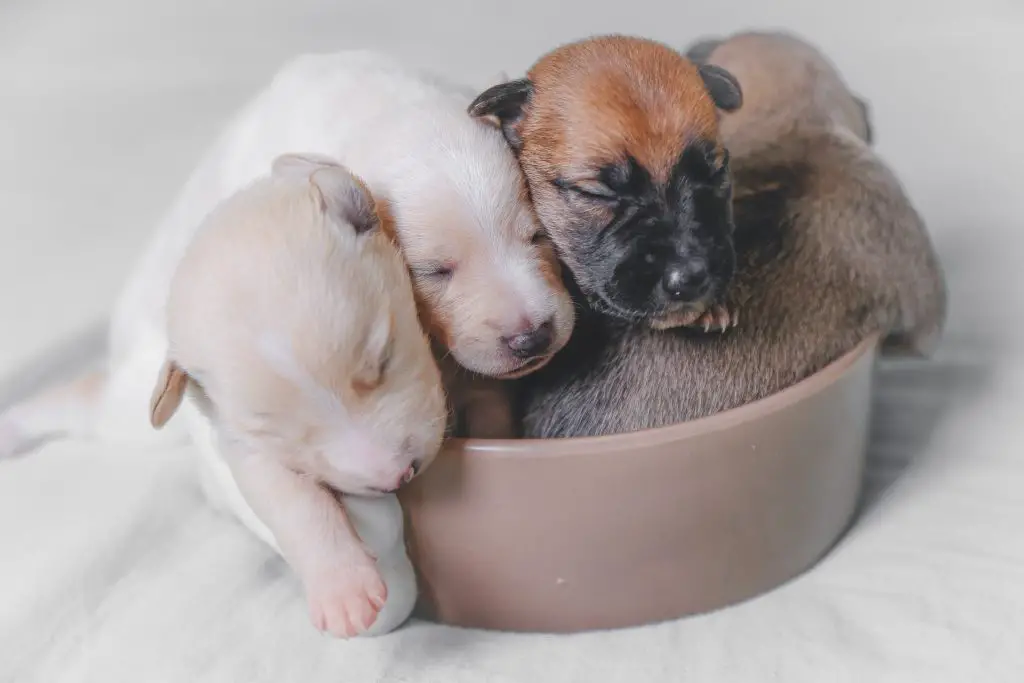
Puppies can begin eating solid food as early as three weeks of age! However, I would recommend that you introduce solid food to your newborn puppies when they are at least six weeks of age.
Of course, they’ll still nurse from their mother during this time, but supplementing with soft, easy-to-digest food is a good way to start.
Puppies need to eat more often than adult dogs because they are growing so quickly. A good rule of thumb is to feed your puppy three to four times a day. As your puppy gets older, you can start to space out their meals and eventually transition to twice-a-day feedings.
When it comes to finding the best kibble for your young puppies, there are a few things you need to take into account. The first is what kind of ingredients are in the kibble. You want to ensure that the kibble you choose has high-quality ingredients that will give your puppies the nutrients they need. Another thing to consider is how small the pieces of kibble are.
Newborn puppies have very small mouths and can’t handle large pieces of food. You’ll also want to find a kibble that’s easy for them to digest. Puppies have sensitive stomachs, so it’s important to find a kibble that won’t upset their tummies.
8. Do not show your newborn litter of puppies to your friends
There are a few reasons for this. First, it can be extremely overwhelming for a newborn litter to be around a lot of people. They are just trying to adjust to the world and their new surroundings and too much stimulation can by tough on them.
Second, if your friends are bringing over their dogs, there is a risk of disease transmission. Newborns have very weak immune systems and can easily catch something from another dog that an adult dog could shrug off.
Finally, you want your friends to meet the puppies when they’re a little older and more socialized – it’s just more fun for everyone that way!
9. The first veterinarian visit
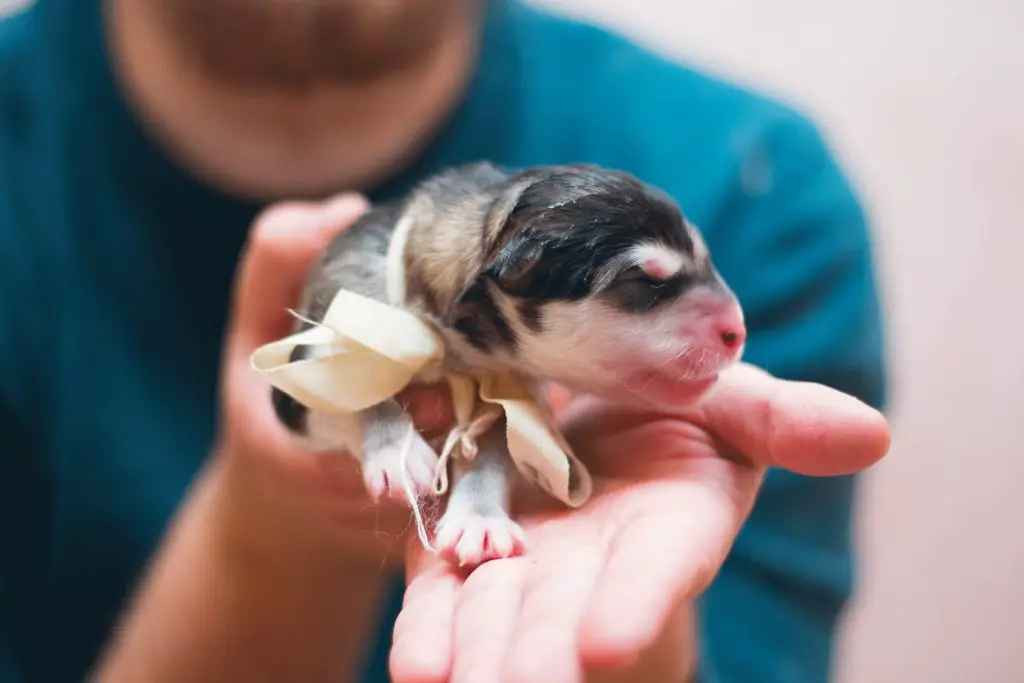
Puppies need to visit the vet for their first set of vaccinations when they are six to eight weeks old. During this visit, your vet will also check for any congenital abnormalities and parasites.
Puppies should then have booster shots every three to four weeks until they are 16 weeks old. After that, they will need a yearly vaccination.
Your puppy will also need to be spayed or neutered around six months of age. This is an important surgery that will help your pet live a longer, healthier life.
Even if your pup seems healthy, there are a few things that your vet can check for and vaccinations that they will need right away. Plus, it’s always good to get started on a good relationship with your vet early on in case of any future health concerns.
Here are a few things that your vet will do during that first visit:
-Check for congenital defects or diseases
-Give the first round of vaccinations
-Deworm the puppy
-Provide you with information on care, feeding, and training
10. Time to start house training
Most experts recommend starting training between the ages of eight and sixteen weeks. This is because puppies at this age are typically more receptive to new information and less likely to have developed bad habits. Of course, you can start training your puppy at any age – it’s never too late to start!
The easiest way to house-train a young puppy is by using the crate method. Puppies are instinctively clean and will not want to soil their sleeping area, so by confining your puppy to a small space such as a crate, they will learn to hold it in until they are let outside.
The key is to be consistent with taking them out frequently, especially after they eat or drink. With patience and consistency, your puppy will be house-trained in no time!
If you’re having trouble housetraining your puppy, there are a few things you can try. First, make sure you are taking them out often enough – at least once every two hours. If that doesn’t seem to be helping, try decreasing the size of their meals. A smaller stomach will mean they will need to go more frequently.
Additional house-training tips:
– Always take your puppy out first thing in the morning and first thing at night, as well as after every meal or drink.
– If possible, take them out every hour during the day as well.
– Puppies usually need to go within 15 minutes of eating or drinking – so keep an eye on the clock!
– When you take them out, bring them to the same spot each time and use the same cue word or phrase (e.g. “go potty”).
– Be sure to praise them enthusiastically when they do go in the right spot – this will reinforce the behavior you want.
– If they have an accident in the house, don’t punish them – just clean it up and move on. They won’t understand why you’re angry and it will only make the housetraining process more difficult.
How Often Should I Weigh The Newborn Puppies?
Newborn puppies should be weighed initially twice a day for the first week or two, and then daily.
According to the American Kennel Club, it is recommended to weigh each puppy 12 and 24 hours after birth to check that they are gaining weight.
It’s important to note that puppies should never lose weight or even maintain weight and should gain at least 10% of their body weight daily.
As a veterinarian, I highly recommend monitoring your puppies’ weight gain by weighing them every day.
This will ensure that they are growing properly and receiving adequate nutrition.
If you notice any sudden weight loss or lack of weight gain, contact your veterinarian immediately as this could be a sign of an underlying health issue.
Common Issues When Caring For a Newborn Litter of Puppies
When caring for a newborn litter of puppies, common issues may include poor nursing, health problems, and separation from the mother.
Poor Nursing
Newborn puppies rely on their mother’s milk for nutrition and immunity. If the mother is not producing enough milk or the puppies are not nursing well, this can lead to health issues such as dehydration, malnutrition, and infection. As a veterinarian, I recommend monitoring the puppies’ nursing habits closely and consulting with a veterinarian if you notice any issues.
Health Problems
Newborn puppies are vulnerable to a range of health problems, including infections, parasites, birth defects, and developmental issues. It’s important to monitor their physical appearance and behavior closely for signs of distress or illness. As a veterinarian, I recommend consulting with a veterinarian for regular checkups and vaccinations.
Separation from the Mother
Newborn puppies need to be with their mother for warmth, nutrition, and socialization. If they are separated from the mother too soon, this can lead to health and behavioral issues later on. As a veterinarian, I recommend waiting until the puppies are at least 8 weeks old before separating them from the mother.
How Often Should I Check on Newborn Puppies?
Newborn puppies should be checked on frequently, ideally every 2-3 hours, to ensure they are nursing well, maintaining body temperature, and not experiencing any distress or health issues.
As a veterinarian, I recommend checking on newborn puppies every 2-3 hours, particularly in the first few weeks of life when they are most vulnerable.
During these checks, you should monitor their behavior, physical appearance, and nursing habits closely to detect any early signs of distress or illness.
If you notice any issues, such as poor nursing, abnormal physical appearance, or signs of health problems, it’s important to consult with a veterinarian as soon as possible to get them the care they need.
It’s also important to ensure that the puppies are kept warm and dry and that their bedding is changed regularly to prevent infections or other health issues.
By checking on newborn puppies frequently and taking proactive steps to address any issues that arise, you can help ensure they stay healthy and thrive in their early weeks of life.
FAQs
Q: What should I look for in the puppies’ mother for signs of distress?
A: When caring for a litter of newborn puppies, it is important to monitor the mother for signs of distress such as excessive panting, restlessness, or refusal to nurse the puppies.
Q: How can I ensure the mother and puppies stay comfortable during the first 24 hours?
A: To ensure the mother and puppies stay comfortable during the first 24 hours, provide a clean and quiet whelping area with a heat lamp to maintain a warm temperature.
Q: Do newborn puppies need any vaccinations?
A: Newborn puppies do not require vaccinations immediately. However, it is important to consult with a veterinarian and follow their recommended vaccination schedule.
Q: How often should I feed the newborn puppies?
A: Newborn puppies should be fed every 2-3 hours until they are about 3 weeks old. After that, the frequency can be gradually reduced as they start eating solid food.
Q: How do I know if the puppies are receiving enough milk from their mother?
A: You can monitor if the puppies are receiving enough milk by checking if they have round bellies and are gaining weight consistently.
Q: When can the puppies start eating solid food?
A: Puppies can start eating solid food at around 3-4 weeks of age. Start by introducing them to moistened puppy food and gradually transition to dry kibble.
Q: How can I keep the puppies and their mother clean?
A: You can keep the puppies and their mother clean by gently wiping their bodies with a warm, damp cloth and ensuring their whelping area is kept clean and sanitized.
Q: How long should the puppies stay with their mother before being separated?
A: Puppies should stay with their mother until they are at least 8 weeks old. This allows them to properly socialize and learn important behaviors from their mother and littermates.
Conclusion and final thoughts
In conclusion, caring for a newborn litter of puppies is both a challenging and rewarding experience.
It requires knowledge, patience, and dedication to ensure the health and well-being of the mother dog and her puppies.
From providing proper nutrition to keeping their environment clean and safe, every aspect of care plays a crucial role in raising happy and healthy puppies.

